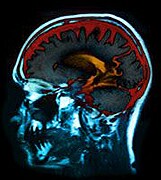 |
 |
 |

Brain Scans Show Heightened Risk for Obsessive-Compulsive Disorder
Found less activity in region that curbs habitual thinking, researchers say|
|
HealthDay
By HealthDay Staff
Thursday, July 17, 2008
 THURSDAY, July 17 (HealthDay News) -- Lowered activity in the brain region involved with stopping habitual behavior may help identify people at higher risk for obsessive-compulsive disorder.
THURSDAY, July 17 (HealthDay News) -- Lowered activity in the brain region involved with stopping habitual behavior may help identify people at higher risk for obsessive-compulsive disorder.
Measuring this underactivation with functional MRI (fMRI) would represent improvement over current diagnostic techniques which rely on clinical interviews with the patient and therefore can't identify the disease until it has already taken hold.
According to background information in a study in the July 18 issue of Science, some 2 percent to 3 percent of the population suffers from obsessive-compulsive disorder, characterized by recurrent thoughts and repetitive actions such as repeated hand washing. The condition seems to run in families, but scientists have not yet been able to pinpoint the actual genetic underpinnings.
Investigators at the University of Cambridge in the United Kingdom measured brain activity in the lateral orbitofrontal cortex (OFC) with fMRI in 14 individuals without a family history of OCD, 14 people with OCD, and 12 of their immediate relatives.
The lateral OFC is involved in decision-making and behavior.
Participants who had OCD or were relatives of people with OCD showed underactivation in this area of the brain.
"Impaired function in brain areas controlling flexible behavior probably predisposes people to developing the compulsive rigid symptoms that are characteristic of OCD," study author Dr. Samuel Chamberlain, of the University of Cambridge's department of psychiatry, said in a university news release. "This study shows that these brain changes run in families and represent a candidate vulnerability factor. The current diagnosis of OCD is subjective, and improved understanding of the underlying causes of OCD could lead to more accurate diagnosis and improved clinical treatments."
HealthDay
Copyright (c) 2008 ScoutNews, LLC. All rights reserved.
More News on this Date
Related MedlinePlus Pages:
| Home | Health Topics | Drugs & Supplements | Encyclopedia | Dictionary | News | Directories | Other Resources | |
| Disclaimers | Copyright | Privacy | Accessibility | Quality Guidelines U.S. National Library of Medicine, 8600 Rockville Pike, Bethesda, MD 20894 National Institutes of Health | Department of Health & Human Services |
Date last updated: 18 July 2008 |




